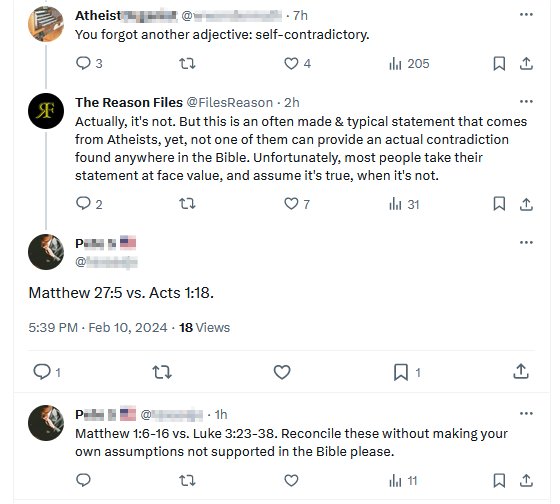While on X (Twitter) today, I came across a thread which began with a statement regarding the uniqueness of the Bible. After several people posted their own examples, an Atheist finally chimed in stating the Bible was contradictory. This is a common accusation made by Atheists, yet they have no once been able to provide a single example of an actual contradiction found in the Bible; and, I stated as such in my own posted comment.
In response to me comment, another user provided two examples of what he claimed were contractions (Matthew 27:5 vs Acts 1:18 and Matthew 1:6-16 vs Luke 3:23-38), and then challenged me to reconcile them. He then attempted to hinder my reconciliation by stating, “Reconcile these without making your own assumptions not supported in the Bible please.” In other words I was to reconcile them using only passages found in the Bible. To quote one of my former bosses, “Homie don’t play that game!” You’ll see why as I reconcile these two examples of alleged contradictions.
But first, let me explain exactly what a contradiction is
A contradiction occurs when a statement is presented as both true and false at the same time. In other words, X cannot be X and not X at the same time. A contradiction cannot be proven and logic will prove it false. Clearly then, the examples given are not actual contradictions. They are, however, paradoxes. A paradox is something that at first glance appears to be a contradiction, but logic will prove it to be true and not a contradiction.
Now, on to the examples themselves, and the reconciliation of them using both logic and common sense, as based on the historical context of the passages themselves.
In the first example of Matthew 27:5 vs Acts 1:18, there is nothing contradictory. If one stated he threw the pieces of silver into the temple, and the other stated he handed the pieces of silver to the priests, then there would be a contradiction. Logic tells us, however, that he threw the pieces of silver into the temple, then left and hanged himself.
Using Matt. 27:5 as a foundation, we then look at Acts 1:18 and see that he had acquired the field, and then fell headlong, burst open and his intestines gushed out.
Understanding the beliefs and teachings of the Jewish priests, Pharisees, Sadducees, and Scribes of that time period we know they would not keep the pieces of silver because they were blood money, initially used to induce Judas to betray Jesus so they could kill Him. So they used the silver to buy the field, and in order to keep their name out of it (and thus avoid any scandal attached to their names) they would have purchased it in Judas’ name.
Although it appears that there is a kind of timeline in Acts 1:18 (he purchased the field and then fell headlong), the passage does not state such. It simply points out two specific actions; the first being that Judas purchased the field, and second that he fell headlong. It does not necessarily mean that one followed or preceded the other, just that they happened.
Logic would indicate that Judas threw the silver pieces in the temple, likely at the chief priests who paid him, then he went out and hanged himself in a field. Jewish law would prevent anyone from taking his body down. They would have left him to be fed upon by birds and wild animals. After time, the body bloated, then, either the weight broke the branch or the cords he used rotted away, and his body fell. Being bloated, he would have literally exploded upon impact with the rocks and earth beneath him. It was then they chief priests purchased that field in Judas’ name. In doing so, as noted they would have distanced themselves from the scandal, and the responsibility for the entire incident would then be placed on Judas and no one else.
Since logic explains the differences between Matthew 27:5 and Acts 1:18, it is a paradox and not a contradiction.
In the second example of Matthew 1:6-16 vs Luke 3:23-38, they are again, not contradictions. In fact, it is quite obvious that we are looking at two entirely different genealogies. Given the fact that Jesus had two parents, each with their own genealogy, this is neither unusual nor contradictory; and both figure into Jesus’ genealogy. Common sense tells us this. The vast majority of biblical scholars point to Matthew as recording the genealogy of Jesus’ earthly paternal lineage through David’s son Solomon; and, Luke as recording His maternal lineage through David’s son Nathan.
The confusion comes about when we see numerous individuals with the same name appearing in both genealogies, or, when two people are listed as being married to the same woman. Understanding Jewish customs and practices of the time resolves these issues. If a man is married, and the union produces no children, then his next oldest brother is obligated to marry his widow in order to produce an heir. As for multiple people with the same name appearing in both genealogies, this is a problem for genealogists even today. After working as a professional genealogist for several years I can attest to this!
As common sense tells us, however, there are innumerable people with the same name, whatever that name may be. There are only a limited number of names to go around, so we end up sharing our names with literally thousands of other people.
So as you can see Dear Reader, there are no contradictions given, only paradoxes, which are resolved when logic, common sense, and an understanding of the historical context are applied to the passages.
After answering the above two alleged contradictions, the poster added a third alleged contradiction, that of Genesis 6:19-20 vs Genesis 7:2-3. Again, using logic and common sense, these two alleged contradictions are also easily resolved.
As with the two previous alleged contradictions, this too is not a contradiction, but a paradox. In this case, Genesis 6:19-20 is the initial requirement given by God regarding the creatures to be carried on the ark; while Genesis 7:2-3 adds to the initial requirement in order to provide enough clean animals to be sacrificed to the Lord. There are to be two of each creature to repopulate the Earth, PLUS seven of each clean animal to provide for acceptable sacrifices to the Lord; something which Noah did after leaving the ark, see Genesis 8:20-21:
“20 Then Noah built an altar to the Lord, and took of every clean animal and of every clean bird and offered burnt offerings on the altar. 21 The Lord smelled the soothing aroma; and the Lord said to Himself, “I will never again curse the ground on account of man, for the intent of man’s heart is evil from his youth; and I will never again destroy every living thing, as I have done.” (NASB95)



 RSS Feed
RSS Feed
